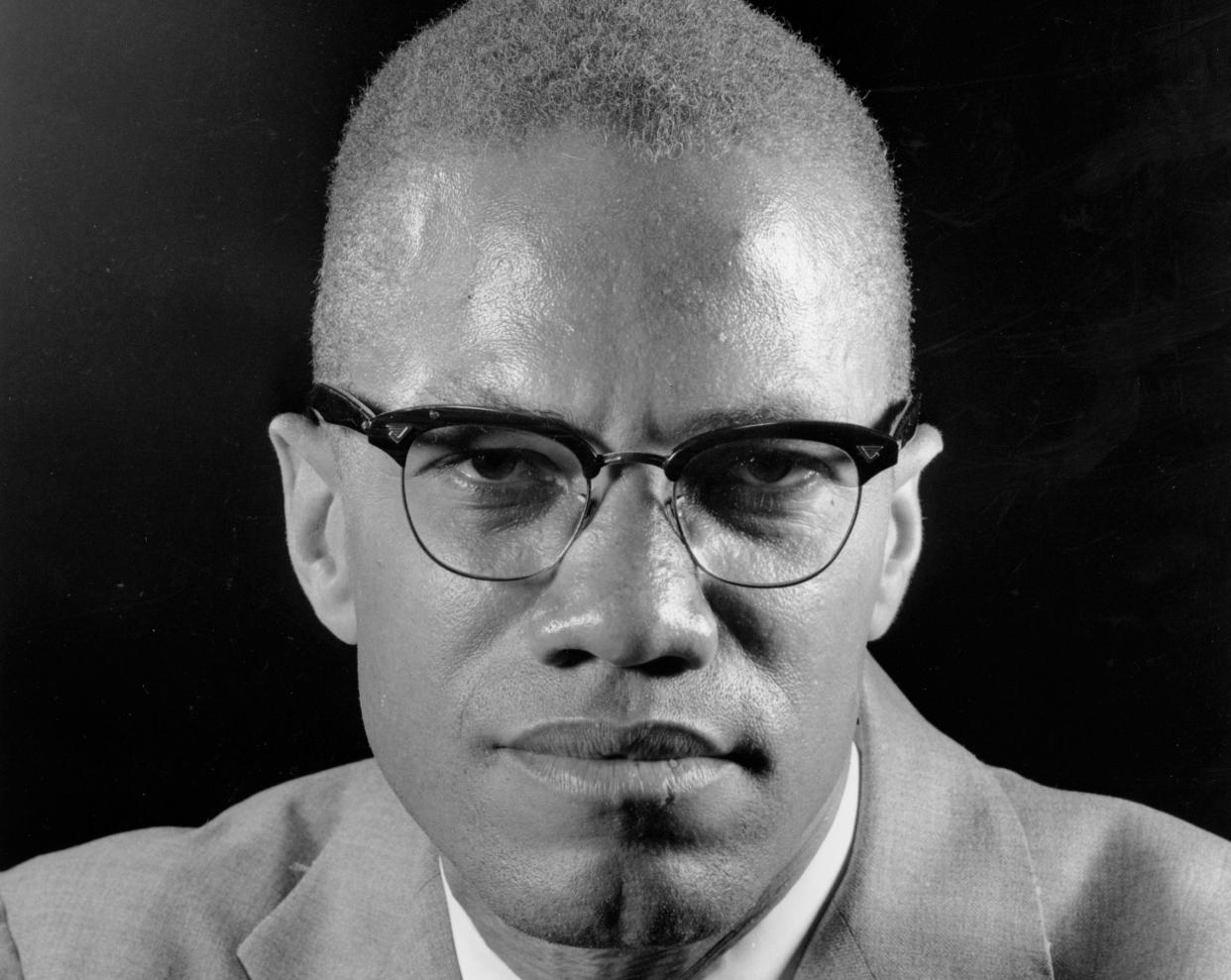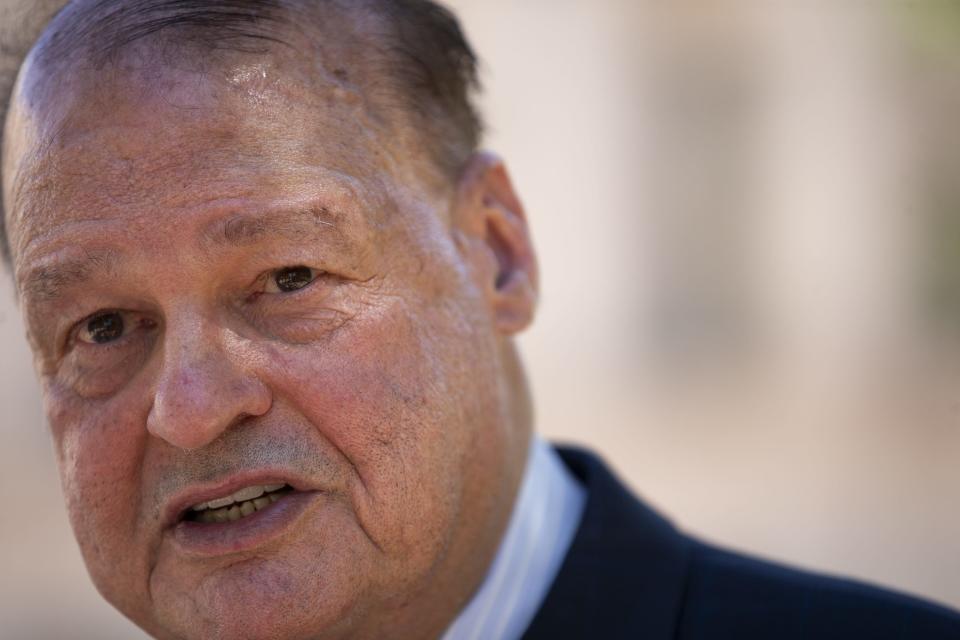Malcolm X would have loved Tom Horne's take on critical race theory

- Oops!Something went wrong.Please try again later.
- Oops!Something went wrong.Please try again later.
Malcolm X would love Tom Horne.
Let’s flash back to September 1964: A brash Olympics gold-medal winner called the “Louisville Lip” went and “shook up the world,” first by beating a fearsome heavyweight champion in Sonny Liston, then by announcing that he had changed his name from Cassius Clay to Muhammad Ali.
President Lyndon Johnson had signed the landmark Civil Rights Act, prohibiting discrimination in schools and other public places. And Barry Goldwater was the conservatives’ choice to challenge Johnson for the White House.
By this point, Malcolm X had become Public Enemy No. 1 for much of America and the mainstream press for calling white people “blue-eyed devils” and saying that the assassination of President Kennedy was simply “chickens coming home to roost.”
And two months before the election, Malcolm X, writing in the Saturday Evening Post, took a counterintuitive position:
“With Senator Goldwater ‘the black people at least know what they are dealing with …they would at least know they were fighting an honestly growling wolf,’ ” he said, according to The New York Times on Sept. 8, 1964.
Malcolm X said Goldwater was such a blatant enemy that he had become a friend.
“If Senator Goldwater became President, according to Malcolm, the Negro would know he had to fight harder and would be ‘more positive in his demands, more aggressive in his protests,’ ” The Times wrote.
How Horne defines critical race theory
And so we have it with Tom Horne, the candidate for superintendent of public instruction, who wants to whitewash history in a state where, according to the National Center for Education Statistics, Latino, Black and Native students constitute a majority and white students are just 46%.
Horne in his crusade against “critical race theory” doesn’t want these students to know their history. Does that mean he wants to doom them to repeat it?
But what is “critical race theory”?
Horne says on his campaign website that it’s an attempt by liberals to “indoctrinate our school children to hate America. They want our children to believe that America is a racist country.”
Horne, with this definition, is playing the boogeyman strategy, taking something benign and whipping it into a malignancy that his base is eager to cut out. It’s a baffling strategy in Arizona since it will appeal to such a narrow sliver of voters.
It should be about contextualizing history

Horne’s interpretation notwithstanding, critical race theory might have a clunky name, but it’s a way of contextualizing history into the present.
Consider why it took Hollywood so long to make “Black Panther,” and why is the character called “Black Panther” in the first place? Is it because the nation’s history has been so situated around the perceived preferences of the white mainstream that nobody considered that an awesome superhero is an awesome superhero?
More from Moore: Arizona Democrats won't win simply by opposing Trump
And that if Black people will buy tickets to Superman and Latinos will buy tickets to Batman then surely they both would buy tickets to see the “Black Panther,” whose name should simply be “The Panther” because “Black Panther” is a redundancy like “new record” or “personal friends”?
Or is it because the executives running the biggest studios were somehow still skeptical of the bankability of a Black star, despite hip-hop music and its first crossover sensation, Will Smith, proving time and again through music, merchandise and movie-ticket sales that global audiences were eager to absorb the Black man’s ideal of cool?
Why shouldn't we teach about these gaps?
Aside from corporate titans, consider the lack of ethnic diversity across all of American leadership. Governors? Senators? University presidents? Media companies?
Is it because despite proof that diverse experiences lead to hugely profitable solutions and innovations, we still have opportunity gaps that hold back qualified minorities?
And would not these gaps stem from the reality that Latino, Black and Native American people have the shared experiences of oppression that include violence and discrimination in law and policy?
And would that not be good to teach, so that A) ethnic minorities won’t think there’s something inherently inferior about themselves or their experiences and B) white kids won’t adopt racist belief systems handed down by people who have no clue of their role in continuing vicious cycles that oppress us all through nepotism and cronyism?
We might want to be a meritocracy, but until I meet a Black executive without pinching myself to see whether I’m dreaming, we’re not there.
We need economic opportunity for all
There’s a reason Black, Latino and Native American people teach their kids that they have to fight twice as hard to get half as far, and it’s a real problem for the U.S.
Consider that businesses need new markets. There’s a massive opportunity for expansion into Indian Country, and for all the ills of gentrification, none can argue that it sparks economic activity, bringing jobs to people who need them. Those markets will never open up without better relationships and more trust.
That starts with acknowledgment and, perhaps, atonement through education that doesn’t strip the history of the nation down to myths (like George Washington and the cherry tree) and stereotypes (like sports mascots).
What if wealthy and tech savvy Black people get fed up with racism in America and start leaving the country to work remotely in Mexico? Or Canada? Or from some Caribbean island where they would live as royalty and spark economic growth in the areas they migrate to? How hard would America be hit by the drain on taxes, spending and brainpower?
What if as Latinos ascend to ever-higher seats of influence, they follow the playbook of conservatives by governing only to benefit themselves and their allies? Would this not perpetuate the mistakes of previous generations, dooming the nation to a vicious cycle of infighting and turmoil, rather than economic opportunity for all?
Horne's playbook won't help him win
But if critical race theory can be boiled down to Horne courting a group of white voters who don’t want to hear anything about history that makes them self-conscious about not being able to turn white privilege into economic privilege, then he’s going to galvanize his opponents into an impenetrable bloc of Latino, Black, Native American and liberal-to-moderate white people.
All that will be left for Horne is the extreme white fringe.
He’s following an outdated playbook that won’t win in post-2020 America.
Malcolm X would love him.
Reach Moore at gmoore@azcentral.com or 602-444-2236. Follow him on Instagram and Twitter @SayingMoore.
There's plenty Moore where this came from. Subscribe for videos, columns, opinions and analysis from The Arizona Republic’s award-winning team.
This article originally appeared on Arizona Republic: What is critical race theory? Malcolm X would love Tom Horne's answer

